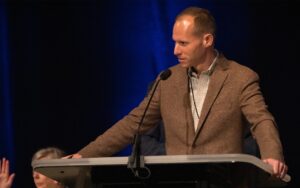
NASHVILLE, Tenn. (BP)–“First, I just want to thank God for making this award possible.”
“Thank you. Thank you very much. We thank our Lord and Savior Jesus Christ, who has given us our talent and this award.”
Such are two of the numerous God-reference responses by current pop groups on this year’s MTV Awards show. In both cases, before the evening’s curtain fell, the singers had performed their hit songs and demonstrated their musical wares before the packed in-house crowd and television audience of millions.
In both cases, the words in their music speak clearly of an open season on teen sex and unbridled physical passion and prowess. The movements on stage are sexually suggestive and provocative to anyone with a heartbeat. The obvious super egos of the superstars are on high beam. They are incredibly cocky. The messages, both overt and covert, fly in the very face of the Jesus they just thanked.
The next day, Christian teenagers around the country seek out their Christian friends at school and say, “Hey, the so-and-sos are Christians! Did you see the MTV Awards last night?”
They’re Christians! They’re Christians? Maybe. Maybe not.
In a crazy world of cultural ambiguity, how can you tell the true believers from those who are just saying the current cool thing? Certain forms of God-talk are definitely “in,” and many have learned how to punch the right buttons as they drop hints of alleged faith. In the 1999 worldwide youth culture, such inconsistencies happen with great regularity. Actors, sports figures, entertainers, musicians and other teen idols often speak openly the name of God; but nothing else about their public lives bears much witness of the lordship of Christ.
Early in his book, “People of the Lie,” author Scott Peck suggests the most obvious forms of evil often come not in the form of something obviously bad, but rather in the cloak of something apparently good.
The Scripture says it this way: “But mark this: There will be terrible times in the last days. People will be lovers of themselves, lovers of money, boastful, proud, abusive, disobedient to their parents, ungrateful, unholy, without love, unforgiving, slanderous, without self-control, brutal, not lovers of the good, treacherous, rash, conceited, lovers of pleasure rather than lovers of God — having a form of godliness but denying its power” (2 Tim. 3:1-5, NIV).
Did you hear it? — “having a form of godliness, but denying its power.” Paul, in his letter to young Timothy, just described much of the spirituality of the youth world in Y2K.
Popular music in the latter half of this century has always been about shoving boundaries. Elvis pushed the envelope not only with his music, but also with his pelvis. The Beatles stretched the boundaries with their hair length and a news conference declaration that they were more popular than Jesus. Janis Joplin and Jimmy Hendricks helped to usher in a new paradigm of rock, and with the advent of the expanded horizon came the overt and upfront usage of drugs to add excitement and fantasy to the whole experience.
It was not long before many teens spotted the raw physical danger of the growing subculture; thus the pop music promoters began introducing cleaner groups to mass produce and sell: the Jackson Five, the Osmonds, the Partridge Family, and even more squeaky clean, the Carpenters. During the next decade or so, the music rocked along with various stars rising and falling, and with some even surviving. It was a time of unprecedented musical, cultural and market development in the world of youth.
As we move into the new millennium, we can say one thing with certainty: What was, at one time, a curious and quirky movement in music has now mutated and exploded into a full-blown youth culture. MTV, with its humble origins in the early ’80s and its mushrooming popularity throughout the mid- and late ’90s, has become the single most powerful force in the galvanizing of a worldwide youth culture.
If you have trouble believing this, take a look at kids on the streets of Tokyo who dress the same as kids in New York, whose funky hair colors and styles bear an uncanny resemblance to those in London, whose body piercings rival those in Rio de Janiero, whose musical tastes meld perfectly with teens in Stockholm, and whose philosophy of relationships and lifestyles are modeled by and mirrored in Los Angeles, Stockholm and Sydney.
It is perhaps the closest thing we have ever seen to cultural cloning on a planetary scale. MTV is, in fact, the largest network on earth.
MTV is only partly about music. It is really about money, marketing, sales and massive global influence. The fact is that a pop group’s music is only a part of the package. In fact, the musical aspect of a band’s or soloist’s marketability quickly becomes a pawn to be bought, sold or discarded at the will of capricious promoters. In 1996, teenagers spent $103 billion in their own money. That’s $70 per week for boys and $64 for girls. Without the burden of normal adult financial responsibilities, virtually all teenage money is disposable.
As a youth culture, the envelope on sex has been pushed significantly. We’ve been back and forth with substance abuse, but it continues to be an enormous problem in the youth culture. Regarding materialism, George Barna has reported that although there is still much verbal disdain for materialism, as a society, we’re still driven primarily by the desire for money. The envelope has even been pushed on the humanitarian front. Stars are now out in record numbers participating in benefits and fund-raisers for compassionate causes.
One major envelope left to be pushed is the envelope of spirituality. When you listen to the music of Jewell, any sensitive person will be moved by the heartfelt spiritual struggles she portrays. U2 sings continually about the constant evolution of their beliefs. R.E.M’s music is abstract, thoughtful and reflective of spiritual themes and dreams.
To say that a group of musicians or an entire medium is moving in a spiritual direction (which the youth culture certainly is) is not to say that movement is necessarily Christ-centered.
Remember, pop music is about shoving boundaries, loosening restrictions and making tons of money. If, in the relentless search and selling out for these goals, key players are seen occasionally and briefly crossing paths with Christ, this should not surprise us. Connecting with Christ is not that unusual. The rich young ruler certainly had a close encounter with the Savior. He even said nice things about the Messiah. Unfortunately, he left Jesus’ presence very sad because he was unwilling to give up his career as the richest man in town in order to follow Christ.
Following are suggestions for bringing Christ-centered spirituality into the lives of teenagers and their music.
— Wish upon a star. But more than wish, pray. Pick out a pop rock star and pray daily that God will confront this person with his incredible love — love so amazing, so divine that it demands the star’s life, soul and all. Study that star, and get to know something about her/him. When you do, it will not be so easy to demonize this person and will be easier to pray compassionately for him/her.
— Keep lines of communication open with your kids. Talk to them about their music, look for the lies in the messages and affirm any elements that are positive.
— Provide alternative musical experiences, not only in what your teens listen to, but also in their own music-making experience. I have committed myself to the development of youth choirs across the nation; and this is a ministry which is thriving, growing and making a huge difference among many teenagers. Find out more about how to begin a youth choir. Help the kids make music (music which glorifies God) rather than remain in the role of a mere consumer.
— Pray without ceasing for yourself, for your teenagers, for their parents and for the icons who influence teenagers. We may think pop stars are powerful, but they are relatively impotent when compared to a teen’s meaningful relationship with a healthy adult role model. The problem is, all too often the relationships and mentors are not there, and that opens the door for teenagers’ idolizing of stars.
— Check out perhaps the best Internet website available for helping Christian parents and leaders relate to teenagers: The Center for Parent/Youth Understanding (www.cpyu.org). In this site, you will find a wealth of information, insights and spiritual guidance for relating to teenagers immersed in the secular culture.
— Be not afraid. Yes, Christian leaders and parents are called on to help their teenagers find a place in a Christian community. This community is actually a subculture, for the prominent culture at this time is certainly not Christian. But this should not surprise us. Our lives and work as God’s people have always been about being a remnant, a minority which strives for a world which honors God and worships him. It has always been a struggle, and the next millennium will be no exception.
Remember, the movement toward spirituality is an honest response of teenagers to connect with something bigger than themselves. Millions of kids lead lonely lives of despair and hopelessness because they have been abandoned emotionally and physically by the adults who should be there for them. Their search can be a desperate one, and many kids find themselves delving into the occult and toying with various world religions simply because those offers them a modicum of hope.
What we have to offer is the hope of Christ which brings joy, fulfillment, peace and companionship. Ours is not a hope based on fantasy but rather on the reality of life in the Spirit. How will they know if we do not love them as Christ loves them? The task is enormous, joyful, difficult, exhilarating, at times painful, and always worth it.
“Be of good cheer; ” said Jesus, “[for] I have overcome the world” (John 16:33).
Edwards is minister of music, First Baptist Church, Shreveport, La., and editor of YouthCue Newsletter. Reprinted by permission from Youth Ministry Update, June 1999, published by LifeWay Christian Resources of the Southern Baptist Convention.














